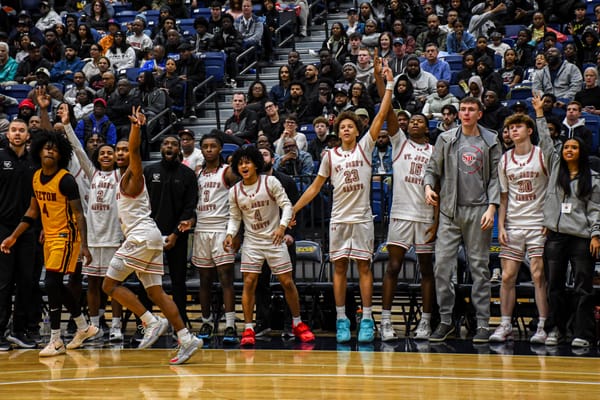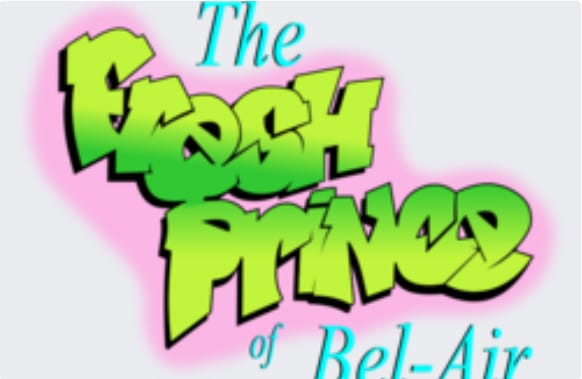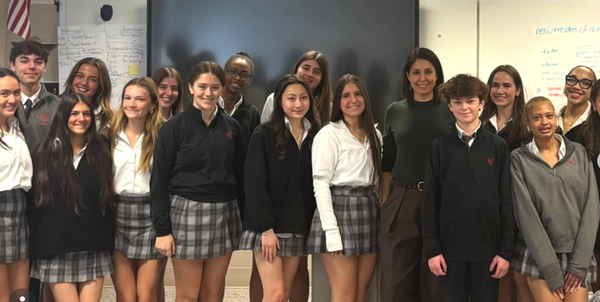A day in the life of an esports competitor

This year, St. Johns started its esports club in association with the High School Esports League (HSEL), currently competing in Overwatch, Super Smash Bros. Ultimate, and Call of Duty: Modern Warfare. While most of you probably understand video games, I can imagine you still have questions about what it’s like to play them in a tournament setting. As someone who’s been participating in competitive Super Smash Bros. since 2017, I’ve got the answers.
I’ll begin with a rundown on some competitive Smash Bros. basics. Players must knock their opponent out of the ring three times or have the most lives remaining after eight minutes to win. Only certain stages are allowed and items are disabled to level the playing field. Best of three or best of five sets are played to find the winner.
Right now, I’m playing Super Smash Bros. Ultimate for St. John’s in the HSEL Winter Open under my usual player tag, DatKirby. For the Winter Open, your matches aren’t scheduled for you; both teams or players are given a deadline by which they have to report the results of their match, and it can be played online any time and day prior to that deadline. It presents some freedom, but I can imagine a whole team of 6 may have issues finding a common time to play for a game like Overwatch. So far, I have 3 wins and no losses, although one of those wins is a forfeit. The two opponents I’ve played have both understood the basics of competitive play, but they lacked some refinement. Their combos were average, and I had an easy time predicting how they’d try to escape pressure once I had the advantage. Additionally, their knowledge of neutral was somewhat underdeveloped. Regardless, it’s good to compete for my high school in my own way. The Overwatch team is also doing well with a 2-1 record, and the Modern Warfare players are starting strong at 1-0.
I’ve played competitive Super Smash Bros. for longer than I’ve competed in the HSEL, though, and the experience is something else entirely. HSEL matches are hosted online, and the swiss bracket style sets the opponent up with a weekly match regardless of their record like any professional sport. The competitive Smash Bros. community, however, functions rather differently. Players must travel to their nearest local tournament, usually weekly or monthly, and compete in a single or double elimination bracket there. Luckily, I live less than an hour away from the Xanadu tournament hosted at Laurel Park, which often gets at least 100 entrants. The best I’ve done at a Xanadu is four wins before getting eliminated, but it’s always a great experience. When you’re playing next to your opponent, there’s no chance for connection issues ruining the experience, and the game feels as smooth as it possibly can. These tournaments are also a great place to meet good players and practice with them before the bracket starts, which makes it easy to improve and make sure your competition is good enough to learn something from. Improving and rising up through the tournament week by week is a satisfying feeling for sure. What’s really amazing is being surrounded by people who have a lot in common with you; for the afternoon, you’re in a room with people who all play competitive Smash Bros. and are excited to have a conversation about it. It can be hard to try to relate to people who won’t understand a lot of my experiences with video games, but the tournaments feel like home.
Even if HSEL isn’t exactly like the standard tournament scenes for the games it hosts, it’s still a great force of recognition for esports. Video games are still not taken seriously by some, and gamers continue to have a poor reputation as basement-dwellers with no social lives. In truth, competitive games like Super Smash Bros. and even single-player games bring people together, and giving high schoolers a place to use their skills and meet others with similar interests helps these people feel like they belong. Games have evolved, and the greater recognition of esports is helping the perception of gamers evolve too.




